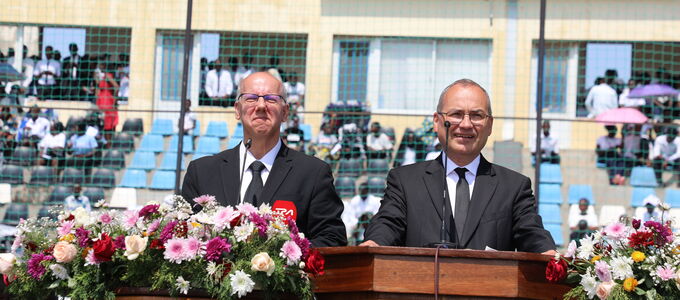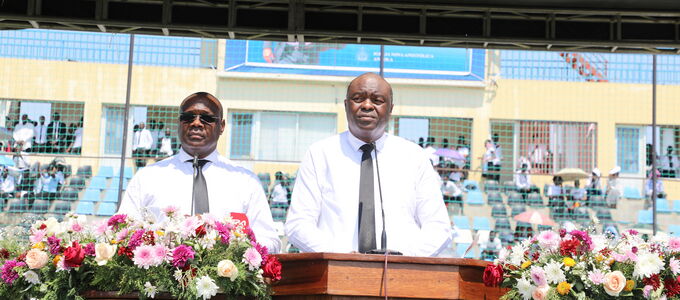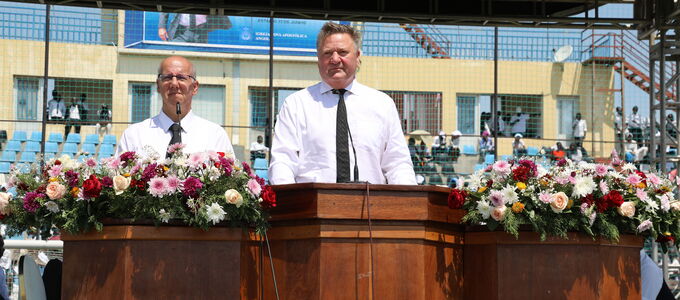Passions that bring suffering
People always have a great many wishes and needs. But which of these should we pursue and which ones should we abandon? The Chief Apostle had some clear words to offer on this subject in a recent divine service. And what is the standard here? Love for God and our fellow human beings.
“We have made a decision: we want to belong to Jesus Christ. And at our baptism, at our Holy Sealing, and at our confirmation, we promised: I renounce evil, and I want to belong to Jesus Christ, I want to follow Him, I want to obey Him, and I want to become like He is.” It was with these words that Chief Apostle Jean-Luc Schneider began the divine service in Luanda, Angola on 5 May. “How seriously do we take this promise?”
Ridding ourselves of whatever causes harm
Apostle Paul’s statement on the matter is very clear: “And those who are Christ’s have crucified the flesh with its passions and desires” (Galatians 5: 24). Here the “flesh” stands for a life of sin, while the notion of “walking in the Spirit” represents a life that is pleasing to God.
First of all, the Chief Apostle stressed that it is alright for us as human beings to strive for both material and non-material things. “In our earthly lives we desire to have enough money on which to live. We may have a desire for honour, power, possessions, or a fulfilled life. God has created us with a body, and this body is allowed to enjoy life,” said the Chief Apostle. “God does not require us to give up everything that is beautiful and good.”
Things only begin to take a turn for the negative if we can no longer control our desires, if these desires can no longer be steered by our conscience. Suddenly, these desires can become so great that we no longer pay heed to the law, no longer obey His will, and no longer care about our neighbour. It is at that point that they become sinful passions and desires.
According to Paul, such passions and desires are to be crucified, an image that tells us to reject those things that do not correspond to the will of God, and to banish them from our lives.
Sinful passions
“Now let us take a closer look and see what this means in concrete terms. Allow me to list of few examples in order to make it clear,” the Chief Apostle said before going on to list the following:
Theft: “It is normal to desire to have more money. That is completely in order,” the Chief Apostle said as he began his remarks. But he went on to state that we must always keep our eyes on the law: “You shall not steal” (Exodus 20: 15). “I transgress this law the moment I take something that is not my right under the law.” The Chief Apostle then gave an example from congregational life: “The members bring their offerings in the divine service, and the minister takes the money to repair his roof.” That would be theft. “The desire for money can become so great that you no longer respect God or your brothers and sisters.”
Lies: The Chief Apostle also took a closer look at the commandment “You shall not bear false witness against your neighbour” (Exodus 20: 16). “I violate this commandment when I say something and know very well that it is not true. Perhaps I want to have something, and in order to get it from someone I promise something. But in so doing I am fully aware that I will never keep that promise.” The Chief Apostle warned against this: “In that case your desire has become so great that you can no longer control it, and you violate the will of God.”
Doing harm to others: The Chief Apostle also explained the commandment: “You shall love your neighbour as yourself” (Galatians 5: 14). “It is quite alright to have desires and wishes, but as soon as you do harm to your neighbour in order to fulfil your wish, it becomes a wicked desire and a sin.” With regret he noted, “There are many people who want to have more and more, but know quite well that the more they have, the less others will have. But they don’t care. They are only thinking about themselves. But we as children of God have promised God to crucify such desires. We do not want to secure our own well-being at the expense of others.”
Disrupting unity: “The will of God is for us all to be one in Jesus Christ.” In the letter to the Galatians, from which our Bible text is taken, Paul attempts to settle the dispute between the Jewish Christians and the Gentile Christians. Paul accused his contemporaries of insisting on Old Testament laws and thereby disrupting the unity of the congregation. “For these people, their own opinion became a vice. They wanted to insist upon it at the expense of their neighbour.”
Falsifying the doctrine: The Apostles Paul and Peter had to deal with people whose passion became so great that they abused the gospel and Jesus Christ to fulfil their own desires. The Chief Apostle recalled the example of Simon the sorcerer, who wanted to give people the gift of the Holy Spirit for money, and the people in Ephesus who spread false teachings in order to elevate themselves. Unfortunately, even today there are “many people who exploit the gospel and Jesus Christ to make money. Brothers and sisters, let us refrain from doing such things,” the Chief Apostle appealed.
Good things to desire
To conclude the service, the Chief Apostle also listed some good desires from people who have truly accepted Jesus Christ:
- He said, “They have the longing to be with God. For this reason they heed the will of God and act in accordance with His commandments. After all, they know: if we do the will of God, God will be with us.”
- Those who belong to Jesus Christ have the desire to be like Jesus Christ. They are not perfect. They lead completely normal lives, but in all their desires, in all their needs, the most important thing is always: “I want to be like Jesus Christ.”
- “They desire the salvation of their neighbour. No matter what they do, no matter the situation in which they find themselves, no matter what anyone does to them, there is only one thing that lives in their hearts: Jesus wants to save others and we want to help Him do so.”

































